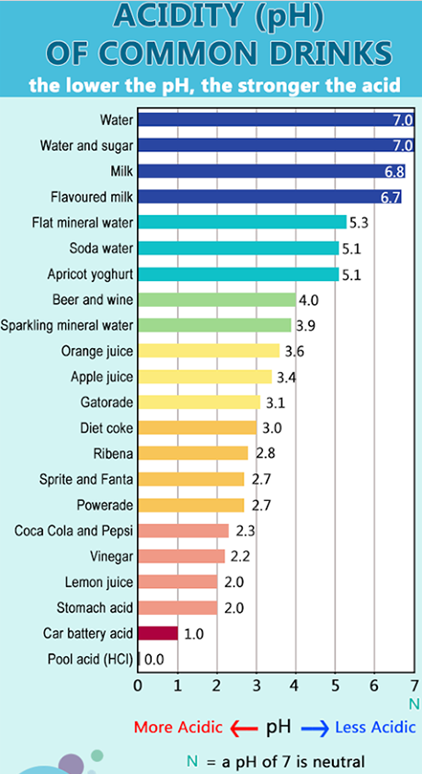How Harmful is Soda For Your Teeth?
First, let’s look at some numbers. About 50% of Americans drink 2.6 glasses of soda daily. This adds up to approximately 45 gallons of soda a year! While most of us know that soda contains high concentrations of sugar, this is only a small fraction of how these beverages harm our teeth. In addition to sugar, soda is very acidic. Acidity is what actually causes the protective outer covering of our teeth (i.e. enamel) to become soft and eroded. Soft, demineralized enamel is more prone to form cavities by bacteria.
How does a cavity form anyway?
Everyone has natural bacteria that live in their mouth. Whenever we eat carbohydrates or sugar, oral bacteria break down the food into simple sugars and excrete acid as a byproduct. The acid they excrete acts as a wrecking ball to punch out holes in our teeth (i.e. cavities). Luckily, our teeth have that protective hard shell, enamel, to counter the bacteria’s actions. However, when we consume foods or beverages that are acidic, we are weakening this natural barrier and giving bacteria the upper hand.
OK, so what drinks should I avoid?
Acidity is measured on a pH scale, where a lower pH value stands for higher acidity. Below, there is a chart illustrating the acidity of commonly consumed beverages compared to battery acid. Most of us would agree drinking battery acid is a no-no. But, its effects in tooth structure are similar to many drinks we consume regularly. As you look at this diagram, keep in mind that tooth enamel begins to demineralize, or soften and erode at pH of 5.5 and lower.
What if I simply cannot avoid these drinks? Is there a way to save my teeth?
Don’t worry. You do not need to give up wine, coffee, or soda entirely. There are steps you can take to minimize their harmful effects:
- Rinse your mouth with water or milk after consuming acidic beverages. This allows the pH of your mouth to neutralize and prevents ongoing enamel erosion long after you finish your drink.
- Chew sugarless gum – especially gum containing xylitol. Xylitol is a natural sweetener that cannot be broken down by oral bacteria. Consequently, it stops the cavity process and keeps the oral pH neutral.
- AVOID BRUSHING IMMEDIATELY AFTER CONSUMING ACIDIC DRINKS! This is important. As soon as something acidic touches your teeth, they begin to weaken. If we brush right away, the abrasiveness of the brush and toothpaste can further harm the already weakened, soft enamel. This is why it is beneficial to rinse with water to remove lingering acidity from teeth.
- Remember to floss and brush twice every day as a part of your normal routine to ensure a healthy oral environment and decrease the number of cavity forming bacteria.
References
http://xylitol.org/xylitol-uses/dental-benefits-of-xylitol
http://www.smilealive.com/blog/what-does-acid-have-to-do-with-cavities
http://www.mycomfortcaredental.com/really-bad-soda-teeth/
http://www.1dental.com/blog/2013/08/21/worst-soda-for-teeth/

